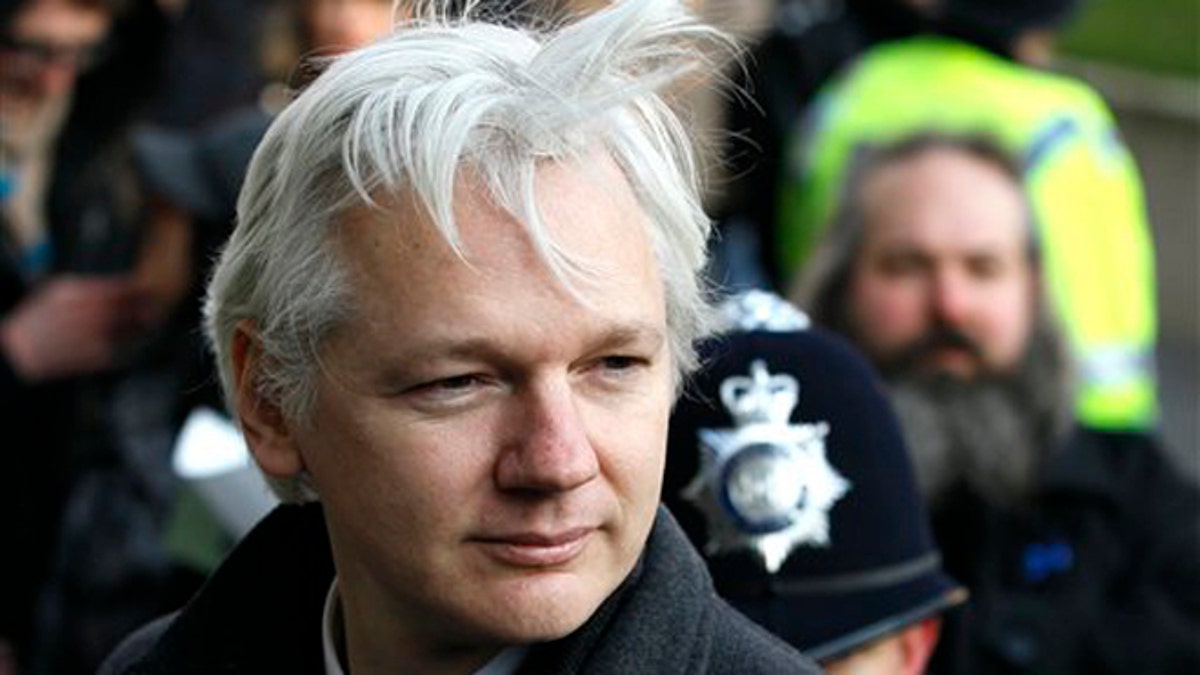
JUNE 28, 2012: British authorities have demanded Julian Assange report to station in order to begin his extradition process to Sweden. (AP)
LONDON – WikiLeaks chief Julian Assange has taken refuge at the Ecuadorian Embassy in London, seeking asylum in a long shot move that would see him trade the glare of an often-hostile British press for the comforts of a small Latin American nation governed by a friendly leader.
Ecuadorean Foreign Minister Ricardo Patino said the leftist government of President Rafael Correa -- an administration often at odds with Washington -- was weighing the request. He did not indicate when a decision might be made.
Assange's legal options in the U.K. had almost completely run out. Less than a week ago Britain's Supreme Court re-endorsed its decision to allow the 40-year-old's extradition to Sweden, where he is wanted over sex crimes allegations. The accusations -- which stem from Assange's trip to the country in mid-2010 -- have cast a cloud over his online organization's spectacular leaks of U.S. military, diplomatic, and intelligence material.
Ecuador -- where less than one in three people have access to the Web -- may seem an unlikely place for the former computer hacker to seek refuge, but in many ways it's an obvious choice.
"It's one of the few countries that has given a great opening to Assange's entire cause," said Grace Jaramillo, an international relations professor at Ecuador's FLACSO university.
"Correa sees Assange as a critic of the status quo," he said. "He has been challenging the United States and Correa likes that."
Assange argues that extradition to Sweden is a first step in efforts to remove him to the United States, where he claims to have been secretly indicted over his disclosure of 250,000 State Department cables. He has spent the better part of two years fighting the move through the British courts.
But legal experts said Assange's flight to the Ecuadorean embassy was a desperate one.
U.K. extradition specialist Karen Todner said she couldn't make sense of the move, while Michael Scharf, based at the Case Western Reserve University School of Law in Cleveland, Ohio, said he didn't believe Assange could be given asylum status.
"I think they are going to end up asking him to leave the premises," said Scharf.
Ecuador's mission in London said in a statement that Assange would "remain at the embassy, under the protection of the Ecuadorian government," while his application was considered. Britain's foreign ministry said it was working with Ecuadorean authorities to resolve the situation, but gave few other details.
WikiLeaks confirmed its leader's request for political asylum on its Twitter account, but calls, texts and emails seeking further comment from Assange and other WikiLeaks members weren't immediately returned.
Patino, speaking at a news conference in Quito, the Ecuadorean capital, gave the fullest account of Assange's reasoning, saying he had personally written to Correa to ask for asylum.
Assange, who is Australian, had argued that "the authorities in his country will not defend his minimum guarantees before any government or ignore the obligation to protect a politically persecuted citizen." Patino said. That may be a reference to Australian Prime Minister Julia Gillard, who last month said that her country could not protect Assange from other countries' justice systems.
Ecuador has made friendly noises about Assange in the past. In the November 2010, at the height of the media storm over WikiLeaks' disclosures, its government appeared to offer him sanctuary, and on Assange's newly-launched television talk show -- which interviewed Correa via videolink earlier this year -- the pair swapped jokes and messages of encouragement.
It was during the interview that Assange received an offer of asylum, according to a woman who was present during the shows and familiar with the offer. She spoke on condition of anonymity because she was not authorized to speak to the media.
It was not immediately clear if the offer came directly from the president himself, although at one point Correa saluted WikiLeaks and told Assange to take courage.
"Welcome to the club of those who are persecuted!" said Correa, whose government has been assailed by human rights and press freedom activists for using Ecuador's criminal libel law in sympathetic courts against journalists from the country's biggest newspaper, El Universo.
Assange and his allies had been in discussions over a possible attempt to seek sanctuary in Ecuador since last weekend, according to a person familiar with the matter.
"His concern was that once he arrived in Sweden he would be held in custody and would not have a chance to seek sanctuary again," the person said, speaking on condition of anonymity because of the sensitivity of the case.
The person said that Assange had explained his reasons for seeking sanctuary to the supporters who put up bail.
It wasn't immediately clear whether the escape to the Ecuadorian Embassy would invalidate Assange's strict bail conditions, or whether the 200,000 pounds (roughly $315,000) put up by his supporters would be forfeited.
British officials didn't immediately respond to requests for clarification late Tuesday. Assange's U.K. law firm declined comment.
It's also unclear how Assange could hope to get from the Ecuadorean Embassy, based in London's wealthy Knightsbridge neighborhood, to Ecuador itself.
The embassy's buzzer rang unanswered Tuesday, although at several points an unidentified figure peeked out from behind the curtain to look at reporters clustered around the building's entrance.
At one point two men emerged from the building; neither addressed the assembled media, but one bore a folio entitled "Diplomatic Law."
Claes Borgstrom, the lawyer representing the two Swedish women with claims against Assange, told Swedish daily Dagens Nyheter late Tuesday that Assange's latest move was a delaying tactic.
"It's tragic for the two clients that I represent," he was quoted as saying. "I can't imagine that this will lead anywhere."








































